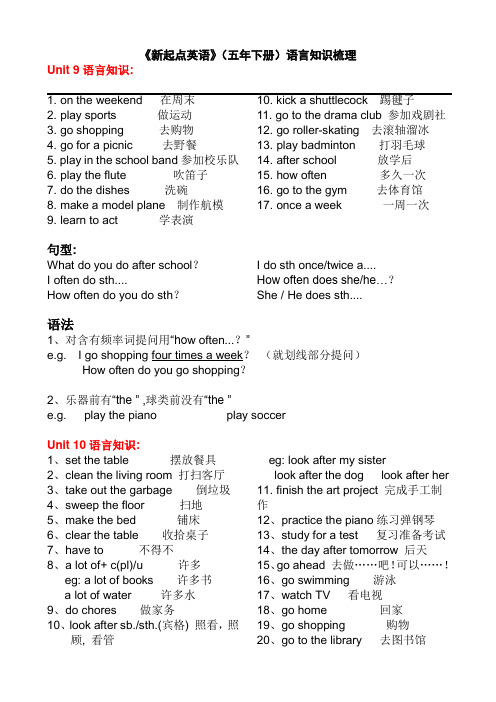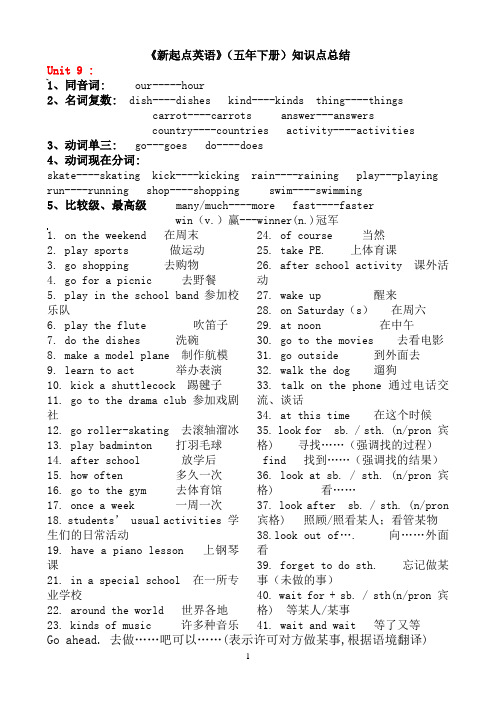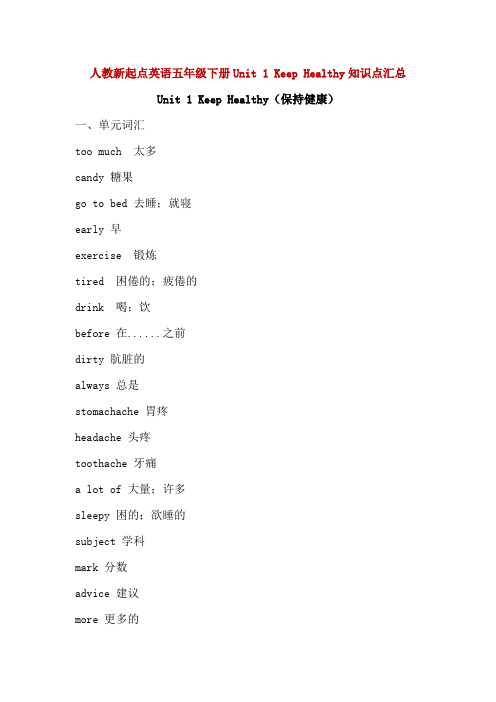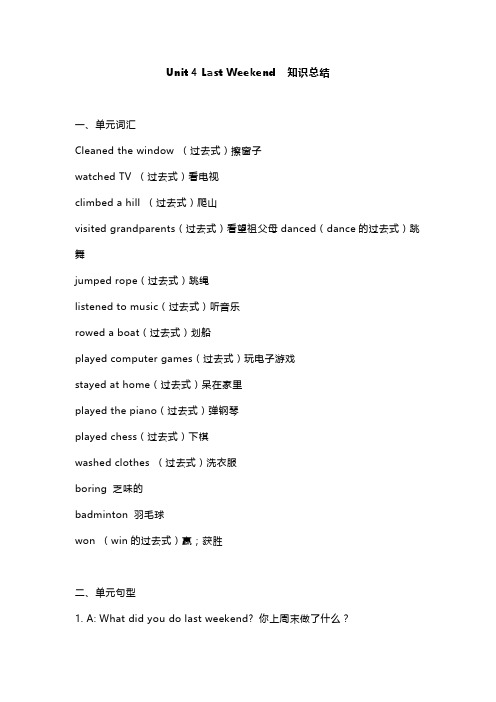《新起点英语》(五年级下册)_知识总结_
人教新起点英语五年级下册(五下)知识点

2.询问某人生日日期的问句及回答:—When is+形物代/名词所有格+birthday?—It's on+几月几日./形物代/名词所有格+birthday+is on+几月几日.例:—When is your birthday?你的生日是什么时候?—My birthday is on April4th.我的生日是4月4日。
3.①基数词用来表示人或物的数量,后面常跟复数名词(one除外):I have two pencils.我有两支铅笔。
②序数词用来表示顺序先后:Our classroom is on the second floor.我们的教室在二楼4.基数词变序数词的变化规则:(1)一般情况,在基数词后直接+th。
seven-seventh;thirteen-thirteenth;four-fourth(2)一、二、三,特殊记one-first;two-second;three-third(3)九去e,ve要用f替nine-ninth;five-fifth;twelve-twelfth(4)以-ty结尾时,边y为i再加-th。
twenty-twentieth;thirty-thirtieth(3)表示几十几,变个位即可。
twenty-two→twenty-second;thirty-five→thirty-fifthUnit5Whose dog is it?重点词汇:her她的playing(正在)玩耍yours你(们)的his他的jumping(正在)跳theirs他/她/她们的mine我的eating(正在)吃excited兴奋的;激动的ours我们的climbing(正在)攀爬like像.....那样its它的drinking(正在)喝sleeping(正在)睡觉重点短语:a beautiful painting一幅美丽的画look at看in the kitchen在厨房a picture of Shanghai一幅上海的图each other相互listen to music听音乐take him to the park把他带到公园come here过来play with him和他一起玩耍swim like a fish像鱼一样游泳of course当然run so fast跑得这么快dance like a bear像熊一样跳舞take pictures拍照so cute这么可爱run like a tiger像老虎一样跑drink water喝水walk like an elephant像大象一样走路重点句型1.The yellow picture is mine.这幅黄颜色的画是我的。
《新起点英语》(五年级下册)语言知识

《新起点英语》(五年下册)语言知识梳理Unit 9语言知识:1. on the weekend 在周末2. play sports 做运动3. go shopping 去购物4. go for a picnic 去野餐5. play in the school band参加校乐队6. play the flute 吹笛子7. do the dishes 洗碗8. make a model plane 制作航模9. learn to act 学表演10. kick a shuttlecock 踢毽子11. go to the drama club 参加戏剧社12. go roller-skating 去滚轴溜冰13. play badminton 打羽毛球14. after school 放学后15. how often 多久一次16. go to the gym 去体育馆17. once a week 一周一次句型:What do you do after school?I often do sth....How often do you do sth?I do sth once/twice a.... How often does she/he…?She / He does sth....语法1、对含有频率词提问用“ho w often...?”e.g. I go shopping four times a week?(就划线部分提问)How often do you go shopping?2、乐器前有“the ” ,球类前没有“the ”e.g. play the piano play soccerUnit 10语言知识:1、set the table 摆放餐具2、clean the living room 打扫客厅3、take out the garbage 倒垃圾4、sweep the floor 扫地5、make the bed 铺床6、clear the table 收拾桌子7、have to 不得不8、a lot of+ c(pl)/u 许多eg: a lot of books 许多书a lot of water 许多水9、do chores 做家务10、look after sb./sth.(宾格) 照看,照顾, 看管eg: look after my sisterlook after the dog look after her 11. finish the art project 完成手工制作12、practice the piano练习弹钢琴13、study for a test 复习准备考试14、the day after tomorrow 后天15、go ahead 去做……吧!可以……!16、go swimming 游泳17、watch TV 看电视18、go home 回家19、go shopping 购物20、go to the library 去图书馆21、listen to music 听音乐22、go to the park 去公园交际用语:1. go ahead. 去做……吧,可以……(表示许可,允许对方做某事。
《新起点英语》(五年级下册)_知识总结_

《新起点英语》(五年下册)知识点总结Unit 9 :1、同音词: our-----hour2、名词复数: dish----dishes kind----kinds thing----thingscarrot----carrots answer---answerscountry----countries activity----activities3、动词单三: go---goes do----does4、动词现在分词:skate----skating kick----kicking rain----raining play---playing run----running shop----shopping swim----swimming5、比较级、最高级 many/much----more fast----fasterwin(v.)赢---winner(n.)冠军1. on the weekend 在周末2. play sports 做运动3. go shopping 去购物4. go for a picnic 去野餐5. play in the school band参加校乐队6. play the flute 吹笛子7. do the dishes 洗碗8. make a model plane 制作航模9. learn to act 举办表演10. kick a shuttlecock 踢毽子11. go to the drama club 参加戏剧社12. go roller-skating 去滚轴溜冰13. play badminton 打羽毛球14. after school 放学后15. how often 多久一次16. go to the gym 去体育馆17. once a week 一周一次18. students’ usual activities 学生们的日常活动19. have a piano lesson 上钢琴课21. in a special school 在一所专业学校22. around the world 世界各地23. kinds of music 许多种音乐24. of course 当然25. take PE. 上体育课26. after school activity 课外活动27. wake up 醒来28. on Saturday(s)在周六29. at noon 在中午30. go to the movies 去看电影31. go outside 到外面去32. walk the dog 遛狗33. talk on the phone 通过电话交流、谈话34. at this time 在这个时候35. look for sb. / sth. (n/pron 宾格) 寻找……(强调找的过程)find 找到……(强调找的结果)36. look at sb. / sth. (n/pron 宾格) 看……37. look after sb. / sth. (n/pron 宾格) 照顾/照看某人;看管某物38.look out of…. 向……外面看39. forget to do sth. 忘记做某事(未做的事)40. wait for + sb. / sth(n/pron 宾格) 等某人/某事41. wait and wait 等了又等Go ahead. 去做……吧可以……(表示许可对方做某事,根据语境翻译)May I draw a picture here? Go ahead.(去画吧。
人教新起点英语五年级下册Unit 1 Keep Healthy知识点汇总

人教新起点英语五年级下册Unit 1 Keep Healthy知识点汇总Unit 1 Keep Healthy(保持健康)一、单元词汇too much 太多candy 糖果go to bed 去睡;就寝early 早exercise 锻炼tired 困倦的;疲倦的drink 喝;饮before 在......之前dirty 肮脏的always 总是stomachache 胃疼headache 头疼toothache 牙痛a lot of 大量;许多sleepy 困的;欲睡的subject 学科mark 分数advice 建议more 更多的二、单元句型1. A: What s wrong? 怎么了?B: I ve got a stomachache. 我肚子疼。
2. A: I often have stomachaches. What should I do?我经常肚子疼。
我应该怎么办?B: You should drink some water. 你应该喝些水。
3. Here you are. 给你。
4. A: Do you eat a lot of candy? 你吃了很多糖吗?B: Yes, I eat some after every class. 是的,我每节课后都吃很多。
5. You shouldn t eat too much candy. 你不该吃太多糖。
6. A: Do you wash your hands before eating? 你饭前洗手了吗?B: Not always. 不总洗。
7. You shouldn t eat with dirty hands. 你不该用脏手吃饭。
8. You should always wash your hands before eating.你应该坚持饭前洗手。
9. I always feel tired and sleepy. 我总觉得很累很困。
人教新起点英语五年级下册第4单元知识总结汇总

Unit 4 Last Weekend 知识总结一、单元词汇Cleaned the window (过去式)擦窗子watched TV (过去式)看电视climbed a hill (过去式)爬山visited grandparents(过去式)看望祖父母danced(dance的过去式)跳舞jumped rope(过去式)跳绳listened to music(过去式)听音乐rowed a boat(过去式)划船played computer games(过去式)玩电子游戏stayed at home(过去式)呆在家里played the piano(过去式)弹钢琴played chess(过去式)下棋washed clothes (过去式)洗衣服boring 乏味的badminton 羽毛球won (win的过去式)赢;获胜二、单元句型1. A: What did you do last weekend? 你上周末做了什么?B: I visited my grandparents. 我去拜访了祖父母。
2. A: How was your weekend? 你周末过得怎么样?B: It was wonderful. 很棒。
3. A: What did you do last weekend? 你上周末做什么了?B: I watched a football match with my friends, and then we played football together. 我和朋友看了足球赛,然后一起踢足球了。
B: On Sunday, I played the violin in a music club. 周日,我在音乐社拉小提琴了。
A: That really sounds fun. 听起来很有趣。
4. A: How was your weekend? 你的周末怎么样?B: It was great on Saturday. 周六很棒。
人教新起点小学五年级英语下册期末知识点汇总

人教新起点小学五年级英语下册期末知识点汇总Unit 1 Keep Healthy(保持健康)一、单元词汇(小朋友,千里之行,始于单词哦!)too much 太多 candy 糖果 go to bed 去睡;就寝early 早exercise 锻炼 tired 困倦的;疲倦的 drink 喝;饮before 在......之前dirty 肮脏的always 总是stomachache 胃疼headache 头疼toothache 牙痛 a lot of 大量;许多sleepy 困的;欲睡的subject 学科mark 分数advice 建议more 更多的二、单元句型(小朋友,学会了这些句子,会变得更加优秀哦!)1. A: What's wrong? 怎么了?B: I've got a stomachache. 我肚子疼。
2. A: I often have stomachaches. What should I do?我经常肚子疼。
我应该怎么办?B: You should drink some water. 你应该喝些水。
3. Here you are. 给你。
4. A: Do you eat a lot of candy? 你吃了很多糖吗?B: Yes, I eat some after every class. 是的,我每节课后都吃很多。
5. You shouldn't eat too much candy. 你不该吃太多糖。
6. A: Do you wash your hands before eating? 你饭前洗手了吗?B: Not always. 不总洗。
7. You shouldn't eat with dirty hands. 你不该用脏手吃饭。
8. You should always wash your hands before eating.你应该坚持饭前洗手。
人教版新起点五下英语知识点
五年级下册英语语法知识点第一单元语法知识1.近义词eat breakfast—have breakfast eat lunch—have luncheat dinner—have dinner play sports—do sportsusually—often复数形式:policeman—policemen policewoman—policewomen现在分词:tell—telling三单:say—says同义句:What do you do ? ---What are you? 你是干什么的?2、频度的副词:always 总是,一直usually通常,常常often 经常sometimes 有时候4、介词后跟表示时间的词语时,表示在某年、某月、某个季节,某个时候(在上午,在下午,在晚上)用in;表示在某一天,在星期几用on,在具体的几点几分用at.5、too 和either的用法区别:too和either都是“也”的意思,但too用于肯定句,either 用于否定句。
第二单元语法知识1.同义词:autumn(英)—fall(美)对应词:wake up—sleep go to bed—get up2.三单:say—says ask—asks come—comes3.同义句:What’s your favourite season?(你最喜爱的季节是什么?)----Which season do you like best?(你最哪个季节?)4.表示天气的介词。
当表示某地某个季节的天气情况时,要把季节放在前面,地点放在后面。
其结构为:What’s the weather like in 季节in 地点?第三单元主要语法点:1、关于月份:(1)五月May , 六月June, 七月July,没有简写形式。
九月September 的简写形式是前四个字母加点Sept.其他八个月的简写形式是前三个字母加点。
新起点五年级英语下知识总结
新起点五年级Unit1 知识汇总一、词汇too much太多 candy糖果 go to bed去睡;就寝early早dirty肮脏的exercise锻炼 tired 困倦的;疲倦的drink喝;饮 before 在......之前always 总是 stomachache 胃疼 headache 头疼 subject学科a lot of大量,许多 sleepy困的;欲睡的 mark分数 advice建议more 更多的drink milk 喝牛奶every day每天wash hands洗手do homework 做家庭作业brush teeth刷牙play on computer 玩电脑last night 昨晚have got a stomachache/ toothache/ headache 胃痛/牙痛/头痛turn off关turn on 开many kinds of 许多种类 a little 少许,一些+una few 少许,一些+cn(复数) many+cn(复数) 很多much+un 许多A lot of +cn(复数)/un 许多,大量= plenty of such as 例如some+cn(复数)/un 一些(肯定句中)any+cn(复数)/un 一些(否,疑问句中)healthy 健康的unhealthy不健康的energy能量by the sea在海边wish 愿望choose选择carefully谨慎地thank you for 谢谢你...二、句子1. Please do your homework.2. You should exercise every day and go to bed early.3. We shouldn’t eat too much candy.4. We should eat a lot of fruit.5. -- What’s wrong with you ? -- I’ve got a stomachache.6. -- What should I do? -- You should drink some water.7. Here you are. 8. You shouldn’t eat too much candy.9. -- Do you wash your hands before eating? -- Not always.10. You shouldn’t eat with dirty hands. 11. I have some advice for you.12. We should eat plenty of fruit and vegetables.13. I wish for good health.三、句型结构1. -- What’s wrong with you?= What’s the matter with you?-- I’ve got a/ an + 疾病名称.eg: -- What’s wrong? -- I’ve got a fever.--what’s the matter? --I've got a toothache.2.--What should +主语+do?--主语+ should/ shouldn’t + 动词原形(+其他).eg: You should keep quiet in hospital. You shouldn’t eat too much meat.You shouldn’t play too much on the computer or watch too much TV.You should go to bed before 9:30.四、自然拼读head bread sweater weather healthy heavy thread人教新起点五年级下册Unit2知识汇总一、词汇New Year’s Day新年 Tree Planting Day植树节Father’s Day父亲节Mother’s Day母亲节 Children’s Day儿童节Teachers’ Day教师节National Day 国庆节 Christmas Day圣诞节 birthday生日 plant种植fifth (5th)第五tenth (10th) 第十 twelfth (12th) 第十二celebrate庆祝twenty-fifth (25th) 第二十五 make a poster 制作海报have a picnic野餐office办公室together 在一起;共同 special 特殊的;特别的do chores 做家务buy flowers for mum 给妈妈买花have a party 办派对climb a hill爬山have fun= have a good time 玩得开心presents礼物work hard 努力工作/学习the Dragon Boat Festival 端午节famous著名的poet诗人Halloween 万圣节dress up 打扮roast turkey 烤火鸡wake up醒来have many things to do 有很多事要做二、句子1. -- When is Tree Planting Day? -- It’s on March 12th.2. -- What do you do on that day? -- We often plant trees.3. -- What day is it today? -- It’s Mother’s Day.4. -- What do you do on that day? -- I often buy flowers for my mum.5. -- What are you going to do?-- I am going to make a poster for Tree Planting Day.6. -- How are you going to celebrate it? -- We are going to read some books about trees. Then we are going to make a poster about trees7.Christmas Day is a special day in Western countries for all the family.8.It is the most important holiday for us.9.On Teachers' Day, children say "thank you" to their teachers.10.Christmas is a special day in Western countries for all the family.三、句型结构1. -- When is + 节日? -- It’s on + 具体日期.eg: -- When is Teachers’ Day? -- It’s on September 1st.--When is Mother’s Day? --It’s on the second Sunday of May.2. -- What do you do on that day?-- I/ We + 频率副词+ 动词(短语)原形(+其他).eg: -- What do you do on that day? -- I often make a card for my teacher.-- What do you do on that day? -- We usually clean the office for our teachers. 3. -- How are you going to celebrate + 节日?-- I’m/ We’re going to + 动词(短语)原形(+其他).eg: -- How are you going to celebrate New Year?-- We’re going to make dumplings.--How are you going to celebrate Children’s Day? --I’m not going to school. I’m going to meet my friends and play games.四、自然拼读drink dress driver drip drop tree train trip try trace人教新起点五年级下册Unit3知识汇总一、词汇send an email 发送电子邮件 write a letter写信 make a phone call 打电话send a short message 发送短消息mail a present 邮寄礼物say 说;讲make a video call 打视频电话make a card 制作卡片 flower show花展everywhere 各处;到处row a boat 划船interesting有趣的have a great day 度过美好的一天write back to 回信二、句子1. -- What do you want to do on New Year’s Day?-- I want to write a letter to my father.2. -- What do you want to do on Mother’s Day?-- I want to send a short message to my mother.3. -- What would you like to do?-- I would like to say “ I love you” to my mother.4. Can you help me?5. That’s a great idea.6. I would like to go to Xin Yuan Park with my parents.7.I played in the rain. It was a lot of fun.8.A: What did you do last Sunday? B: I stayed in bed all day. I was ill.Oh, what a pity! I'm sorry to hear that.三、句型结构1. -- What do you want to do on + 节日?-- I want to + 动词(短语)原形(+其他).eg: -- What do you want to do on Children’s Day?-- I want to play with my friends.2. -- What would you like to do(+其他)?-- I/ We would like to + 动词原形(+其他).eg: -- What would you like to do? -- I want to go to flower show.四、自然拼读night light right flight sigh high sigh fight bright thigh人教新起点五年级Unit4知识汇总一、词汇cleaned the window(过去式)擦窗子watched TV(过去式)看电视climbed a hill(过去式)爬山visited grandparents (过去式)看望祖父母danced(dance过去式)跳舞 jumped rope(过去式)跳绳listened to music(过去式)听音乐 rowed a boat(过去式)划船played computer games(过去式)玩电子游戏 badminton 羽毛球stayed at home(过去式)呆在家里played the piano(过去式)弹钢琴played chess(过去式)下棋 washed clothes(过去式)洗衣服boring 单调的;乏味的 won(win的过去式)赢;获胜二、句子1. -- What did you do last weekend? -- I visited my grandparents.2. -- What did you do last weekend? -- I climbed a hill.3. What about you?4. I washed clothes.5. It was boring.6. -- How was your weekend? -- It was wonderful.7. -- What did you do last weekend? -- I watched a football match with my friends, and then we played football together.8. That was cool. 9. What a pity! 10. I’m sorry to hear that.三、句型结构1. -- How was your weekend? -- It was + 形容词.eg: -- How was your weekend? -- It was boring.2. -- What did you do last weekend? -- I/ We + 动词过去式(+其他). eg: -- What did you do last weekend? -- I played the piano.一般过去时一、概念:表示过去时间里发生的动作或存在的状态,或者过去习惯性、经常性的动作。
五年级英语下册期末知识点汇总(人教新起点)
五年级英语下册期末知识点汇总人教新起点五年级 Unit1 知识汇总一、词汇too much 太多 candy 糖果 go to bed 去睡;就寝early 早exercise 锻炼 tired 困倦的;疲倦的drink 喝;饮before 在......之前 dirty 肮脏的always 总是stomachache 胃疼headache 头疼a lot of 大量;许多 sleepy 困的;欲睡的 subject 学科mark 分数advice 建议more 更多的二、句子1. Please do your homework. 请做家庭作业。
2. You should exercise every day and go to bed early. 你应该每天锻炼并早点儿就寝。
3. We shouldn’t eat too much candy. 我们不应该吃太多糖果。
4. We should eat a lot of fruit. 我们应该吃许多水果。
5. -- What’s wrong? 怎么了?-- I’ve got a stomachache. 我胃疼。
6. -- What should I do? 我该怎么办?-- You should drink some water. 你应该喝一些水。
7. Here you are. 给你。
8. You shouldn’t eat too much candy. 你不应该吃太多糖果。
9. -- Do you wash your hands before eating? 你吃东西前洗手吗?-- Not always. 不总洗。
10. You shouldn’t eat with dirty hands. 你不应该用脏手吃饭。
11. I have some advice for you. 我给你一些建议。
三、句型结构1. -- What’s wrong?-- I’ve got a/ an + 疾病名称.eg: -- What’s wrong? 怎么了?-- I’ve got a fever. 我发烧了。
人教版新起点五年级英语下册知识汇总
人教版新起点五年级英语(下册)知识要点汇总,预习必备Unit 1 Keep Healthy一、单元词汇(小朋友,千里之行,始于单词哦!)too much 太多 candy 糖果go to bed 去睡;就寝 early 早exercise 锻炼 tired 困倦的;疲倦的drink 喝;饮 before 在......之前dirty 肮脏的 always 总是stomachache 胃疼 headache 头疼toothache 牙痛 a lot of 大量;许多sleepy 困的;欲睡的 subject 学科mark 分数 advice 建议 more 更多的二、单元句型(小朋友,学会了这些句子,会变得更加优秀哦!)1. A: What's wrong? 怎么了?B: I've got a stomachache. 我肚子疼。
2. A: I often have stomachaches. What should I do?我经常肚子疼。
我应该怎么办?B: You should drink some water. 你应该喝些水。
3. Here you are. 给你。
4. A: Do you eat a lot of candy? 你吃了很多糖吗?B: Yes, I eat some after every class. 是的,我每节课后都吃很多。
5. You shouldn't eat too much candy. 你不该吃太多糖。
6. A: Do you wash your hands before eating? 你饭前洗手了吗?B: Not always. 不总洗。
7. You shouldn't eat with dirty hands. 你不该用脏手吃饭。
8. You should always wash your hands before eating.你应该坚持饭前洗手。
- 1、下载文档前请自行甄别文档内容的完整性,平台不提供额外的编辑、内容补充、找答案等附加服务。
- 2、"仅部分预览"的文档,不可在线预览部分如存在完整性等问题,可反馈申请退款(可完整预览的文档不适用该条件!)。
- 3、如文档侵犯您的权益,请联系客服反馈,我们会尽快为您处理(人工客服工作时间:9:00-18:30)。
《新起点英语》(五年下册)知识点总结Unit 9 :1、同音词: our-----hour2、名词复数: dish----dishes kind----kinds thing----thingscarrot----carrots answer---answerscountry----countries activity----activities3、动词单三: go---goes do----does4、动词现在分词:skate----skating kick----kicking rain----raining play---playing run----running shop----shopping swim----swimming5、比较级、最高级 many/much----more fast----fasterwin(v.)赢---winner(n.)冠军1. on the weekend 在周末2. play sports 做运动3. go shopping 去购物4. go for a picnic 去野餐5. play in the school band参加校乐队6. play the flute 吹笛子7. do the dishes 洗碗8. make a model plane 制作航模9. learn to act 举办表演10. kick a shuttlecock 踢毽子11. go to the drama club 参加戏剧社12. go roller-skating 去滚轴溜冰13. play badminton 打羽毛球14. after school 放学后15. how often 多久一次16. go to the gym 去体育馆17. once a week 一周一次18. students’ usual activities 学生们的日常活动19. have a piano lesson 上钢琴课21. in a special school 在一所专业学校22. around the world 世界各地23. kinds of music 许多种音乐24. of course 当然25. take PE. 上体育课26. after school activity 课外活动27. wake up 醒来28. on Saturday(s)在周六29. at noon 在中午30. go to the movies 去看电影31. go outside 到外面去32. walk the dog 遛狗33. talk on the phone 通过电话交流、谈话34. at this time 在这个时候35. look for sb. / sth. (n/pron 宾格) 寻找……(强调找的过程)find 找到……(强调找的结果)36. look at sb. / sth. (n/pron 宾格) 看……37. look after sb. / sth. (n/pron 宾格) 照顾/照看某人;看管某物38.look out of…. 向……外面看39. forget to do sth. 忘记做某事(未做的事)40. wait for + sb. / sth(n/pron 宾格) 等某人/某事41. wait and wait 等了又等Go ahead. 去做……吧可以……(表示许可对方做某事,根据语境翻译)May I draw a picture here? Go ahead.(去画吧。
)Can I watch TV now? Sure, go ahead.(当然可以,去看吧。
) 句型:What do you do after school?I often do sth....How often do you go there?I do sth once/twice a.... How often does she/he…?She / He does sth....语法1、对含有频率词提问用“how often...?”e.g. I go shopping four times a week?(就划线部分提问)How often do you go shopping?2、乐器前有“the ” ,球类前没有“the ”e.g. play the piano play soccer3、动词现在分词的构成①一般情况下在动词末尾直接加“ing”finish---finishing go----going②动词以不发音“e”结尾,去“e”加“ing”live----living come----coming③在重读闭音节中,以辅音字母结尾,辅音字母前是一个元音字母,双写辅音字母,再加“ing”cut----cutting swim----swimmingUnit 10 :1、set the table 摆放餐具2、clean the living room 打扫客厅3、take out the garbage 倒垃圾4、sweep the floor 扫地5、make the bed 铺床6、clear the table 收拾桌子7、have to 不得不8、a lot of+ c(pl)/u 许多eg: a lot of books 许多书a lot of water 许多水9、do chores 做家务10、look after sb./sth.(宾格) 照看,照顾, 看管eg: look after my sister look after the dog look after her 11. finish the art project 完成手工制作12、practice the piano练习弹钢琴13、study for a test 复习准备考试14、the day after tomorrow 后天15、go ahead 去做……吧!可以……!16、what about+sb./sth./doing sth. ……怎么样?how about+sb./sth./doing sth. ……怎么样?eg: What about you?What about this cap?What about watching TV?17、go swimming 游泳18、watch TV 看电视21、go home 回家23、thank you for 为……而感谢24、go shopping 购物25、go to the library 去图书馆26、listen to music 听音乐27、go to the park 去公园28、It’s time to do sth. 是该做某事的时间了。
It’s time for sth. 到……的时间了。
29、next time下次30、play football 踢足球交际用语:1. go ahead. 去做……吧,可以……(表示许可,允许对方做某事。
根据语境翻译)eg: May I draw a picture here? Go ahead.(去画吧)Can I watch TV now? Sure, go ahead. (当然可以,去看吧)2. Can I go to the movies?Sure, you can. But first you have to finish your project.Sorry, you can’t. You have to practice the violin.句型一:谈论某人必须(不得不)做某事肯定句:主语+ have/ has to do sth.Eg. I have to do sth.否定句: 主语+ don’t have to do sth.Eg. 1. I don’t have to clean the room.2. My mother doesn’t have to go shopping.一般疑问句及答语:Do / Does +主语+have to do sth?Yes, +主语do/does. No, +主语+don’t./ doesn’t.Eg. 1. Do you have to do your homework?Yes, I do. / No, I don’t.2. Does Tom have to do chores every day?Yes, he does. / No, he doesn’t.特殊疑问句: 特殊疑问词 + do / does +主语+ have to do sth?Eg. 1. What chores do you have to do?2. What do you have to do in your spare time?句型二:be going to +动词原形(将来时)eg:肯定句:It is going to be sunny tomorrow.否定句:It isn’t going to be sunny tomorrow.一般疑问句及答语:Is it going to be sunny tomorrow?Yes, it is. / No, it isn’t特殊疑问句:What’s the weather going to be like tomorrow?= How is the weather going to be tomorrow?测试题:It is going to be sunny tomorrow. (写出同意句)—It will be sunny tomorrow.语法:1、在具体某一天的前面用oneg: on Monday 在星期一2、单词以元音开头时,前面冠词用aneg: an e-mail 一封电子邮件 an ear 一只耳朵 an eye 一只眼睛 an elephant 一头大象 an office 一间办公室 an hour 一小时Unit 11 :1. get plenty of sleep保持充足睡眠2. wash your hands before eating吃饭前洗手3. drink milk every day 每天喝牛奶4. clean the desk 擦桌子5. leave garbage everywhere 到处扔垃圾6. drink too much pop 喝太多汽水7. stay up late 熬夜8. eat too much chocolate 吃太多巧克力9. eat too much meat 吃太多肉10. role play 角色表演11. keep fit 保持健康13. tell sb (n/pron宾格)something about doing sth 告诉谋人关于做某事的事吃太多汉堡包太多的牛奶17. have a headache 头痛18. have a running nose 流鼻涕19. have a cold 患了感冒20. have a stomachache 胃疼21. have a toothache 牙痛22. go to bed上床睡觉23. go to see a doctor看医生24. wear a sweater穿着毛衣25.drink more water/milk喝更多水/牛奶26. brush your teeth(pl)刷牙27. take some medicine U28. right after29. feel tired感觉累30. feel sleepy感觉困31. get good marks得好的分数32. be good at + sth. (n/pron宾格)/ doing sth.擅长某事/做某事33. have a problem有个问题34. have advice for sb. (n/pron宾格)有些建议給某人35. do morning exercises做早操36. try these things试着做这些事37. feel better感觉好38. look like看起来像39. want to be 想成为40. healthy habits健康习惯41. school rules 学校规章42. home chores 家务43. wonderful food 很棒的食物44. need to do 需要做45. kinds of food许多种食物46. the bottom of the pyramid金字塔底部47. the top of the pyramid 金字塔顶部48. a little+ U 少许、一点……(强调少而有)a little sugar/ fat 一点盐/脂肪49. junk food 垃圾食品50. be bad for…(n/pron宾格) 对……有害对健康有害51. plenty of+pl)大量的……许多的……plenty of fruit and vegetables 许多的水果和蔬菜52. walk by the sea 在海边散步53 wish(es) for…希望……54. come out 出来55. a big dinner 大餐56. good health 好的健康状况57. good habits 好的习惯58. bad habits 坏的习惯59. keep clean 保持干净60. before doing sth. 在做某事之前before eating 吃饭前61. a grade-five student 一名五年级的学生62.talk about sb./sth/doing sth. (n/pron宾格) 谈论某人/某事/做某事63. agree with sb. (n/pron宾格) 同意某人的意见交际用语:1. What’s wrong? 你怎么了2. I have a cold/ headache/ toothache/ stomachache 我感冒/头痛/牙痛/胃痛。
